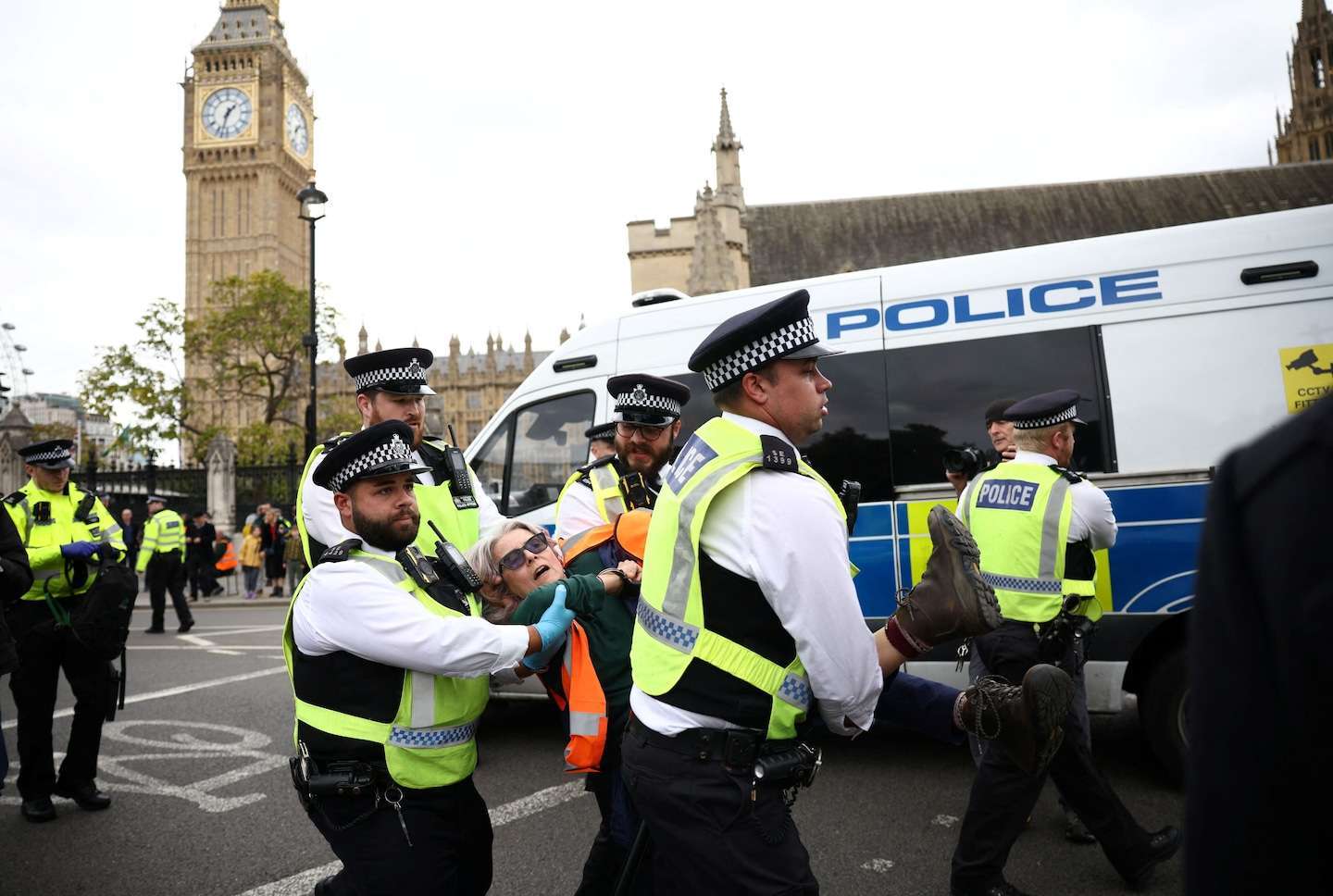LONDON — Britain’s government is moving to crack down on environmental activists who have sparked widespread disruption in recent months, including gluing themselves to key roads and buildings, blocking bridges, hurling soup on a Vincent van Gogh painting and pouring cow’s milk across supermarket floors.
U.K. seeks to expand police powers to target disruptive climate activists

She unveiled details of the proposed legislation in a series of tweets and an article in the Daily Mail newspaper on Saturday, calling the activists “thugs and vandals” who were engaged in “guerrilla tactics.”
The bill “will put the safety and interests of the law-abiding majority first,” Braverman wrote. It comes as Britain reels from yet another tumultuous week under Prime Minister Liz Truss, who in less than six weeks has overseen a plummeting pound, U-turned on tax policies and fired her finance minister, Kwasi Kwarteng.
Climate activists made international headlines as protesters against fossil fuels entered London’s National Gallery, dousing one of Van Gogh’s most famous paintings, “Sunflowers,” in tomato soup on Friday before gluing their hands to the wall.
“Are you more concerned about the protection of a painting or the protection of our planet?” one of the protesters shouted.
Activist group Just Stop Oil, which aims to stop oil and gas projects in Britain, said the protesters were supporters of the organization. More than 350 Just Stop Oil protesters have been arrested this month alone, British media reported, citing Home Office figures.
And “milk pours” took place across Britain, with demonstrators on Saturday pouring bottles of cow’s milk across floors in the upscale Harrods, Whole Foods and Waitrose grocery stores, condemning the dairy industry and calling for customers and supermarkets to stock only plant-based food and drink items.
On Sunday, protesters from Just Stop Oil doused an Aston Martin showroom in bright orange paint and blocked more key roads in London.
Members of the environmentalist group Extinction Rebellion, climate and animal justice group Animal Rebellion and Insulate Britain — which calls for officials to ensure all British homes are insulated to run off low energy — say their mission is to raise awareness of their causes, protect the planet and save lives.
But many of their recent protests have also stirred anger among members of the public. This month, activists stood in the path of a man trying to get his sick partner to the hospital, as well as a mother trying to take her disabled child to school, leading exasperated motorists and commuters to plea with the protesters to let them pass.
“Your behaviour doesn’t further your cause or influence the debate,” Braverman tweeted Saturday. “Your disruptive behaviour stops decent people from going about their daily lives.”
“A small number of people can bring gridlock — and misery,” Braverman said, describing the actions of demonstrators who block roads as “monstrously selfish.”
The bill also aims to clamp down on people found to be creating or participating in the creation of a tunnel — or “tunneling” — a move adopted by demonstrators who dig holes underground where they remain for days on end, often halting planned construction. The government has long branded the move dangerous.
Giving the police broader powers to clamp down on protesters has long been a controversial topic in Britain.
In March of 2021, thousands of protesters gathered in Bristol to denounce the Police, Crime, Sentencing and Courts Bill, which would have allowed authorities to impose start and finish times and set noise thresholds at protests, with fines of up to $3,400 for noncompliance. The protest later turned violent, leaving several police officers injured and buildings vandalized.
That bill passed this year, though Braverman said it does not go far enough, calling it “watered down.”
Critics of the new bill say it has no place in a democratic society. More than 50,000 people have signed a petition calling for it to be dropped.
“The proposals strike at the very heart of protest and could potentially criminalise anyone who takes to the streets for a cause they believe in,” petition organizers said.
But some protesters may not mind. Many of them — including grandparents fighting for the future of younger family members — have said they were willing to go to jail for their beliefs.






